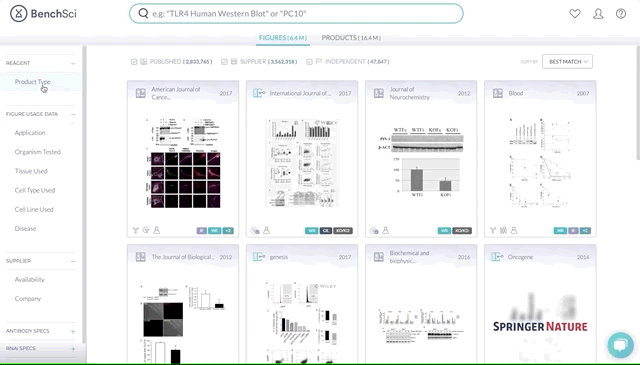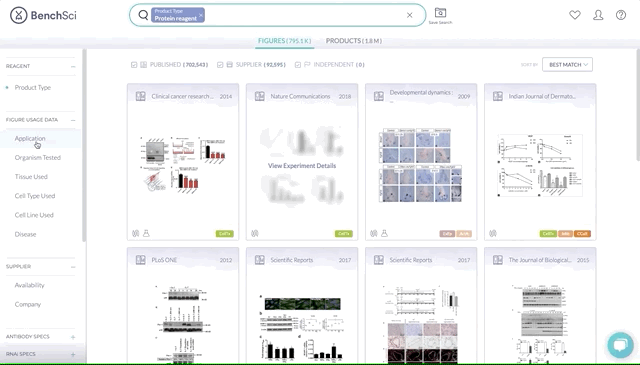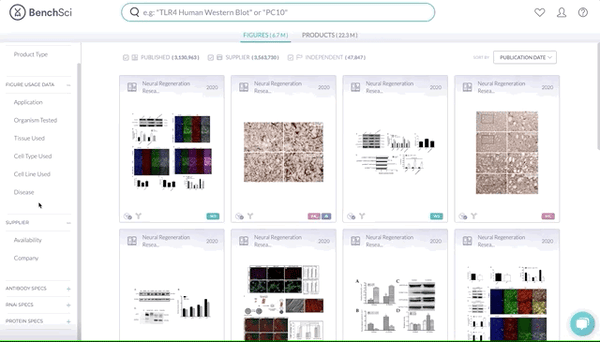At BenchSci, our mission is to exponentially increase the speed and quality of life-saving research. We empower scientists with the world’s most advanced biomedical artificial intelligence to run more successful experiments.
To achieve this mission, we launched the AI-Assisted Reagent Selection platform for antibodies and RNAi reagents, which has since been adopted by top pharmaceutical companies in the world to improve R&D efficiencies and to advance drug development pipelines.
To expand the coverage and utility of our AI-Assisted Reagent Selection platform, we are excited to announce the addition of a new class of reagents, proteins! Through our newly developed, proprietary machine learning and data collection pipelines, we have added over 1.8 million protein reagent products from 73 suppliers, and collected 2 million peer-reviewed data points from experiments in over 10 million open- and closed-access journals. The types of protein reagents include:

- Recombinant proteins
- Native proteins
- Peptides
- Cytokines and growth factors
- Antigens
- Enzymes
- Other proteins (ie. synthetic or unspecified)
Why protein reagents?
Protein reagents play a critical role in Target Discovery and Target Validation stages during the initial phase of drug development. For example:
- Native Proteins are used as controls to verify antibody specificity
- Peptides are used to disrupt protein-protein interactions
- Antigens are used to generate antibodies with therapeutic potential
- Enzymes and growth factors are used in cell treatments to elucidate the molecular mechanisms associated with disease pathways
While commonly used (second to antibodies by purchases), finding the right protein reagent is often challenging. This is because different protein names are used in various data sources, ranging from publications to vendor websites, making it difficult to consolidate product availability and publication data for a given protein from keyword-based searches. To overcome this, we specifically trained our machine learning algorithm to decode protein reagent usages in published experiments, so you can easily identify commercial protein products, and the associated publication data, that are the most relevant to your experiments.
How can I access the protein data?
Available to enterprise customers on our AI-Assisted Reagent Selection platform, the "Product Type" filter now includes an option for protein reagents, along with the specific subtypes that can also be selected in combinations:

With the protein product type filter applied, the "Application" filter will automatically update to show only applications that use protein reagents, such as surface plasmon resonance (SPR), inhibition/blocking assays, and more. Similarly, the rest of the "Figure Usage Data" filters will show only experimental contexts that are specific to protein reagents.

In addition, we added a brand new set of filters for Protein Specs, derived from vendor-provided catalog data, to help you hone in on protein reagents with the desired specifications. These include:
- Species
- Expression System
- Bioactivity
- Grade
- Sequence
- Domain
- PTM (post-translational modifications)
- Modification
- Purification
- Formulation

We're working to continuously evolve the protein selection capabilities on the AI-Assisted Reagent Selection platform to support you and your research efforts. For example, we learned that the ability to search for chimeric proteins and to filter proteins by domains are useful to many scientists, so we enabled features to help you do so. We would love to hear about how you search for protein reagents and how we can help. Let us know in the comment section below, and subscribe to our blog to be notified of future updates!
